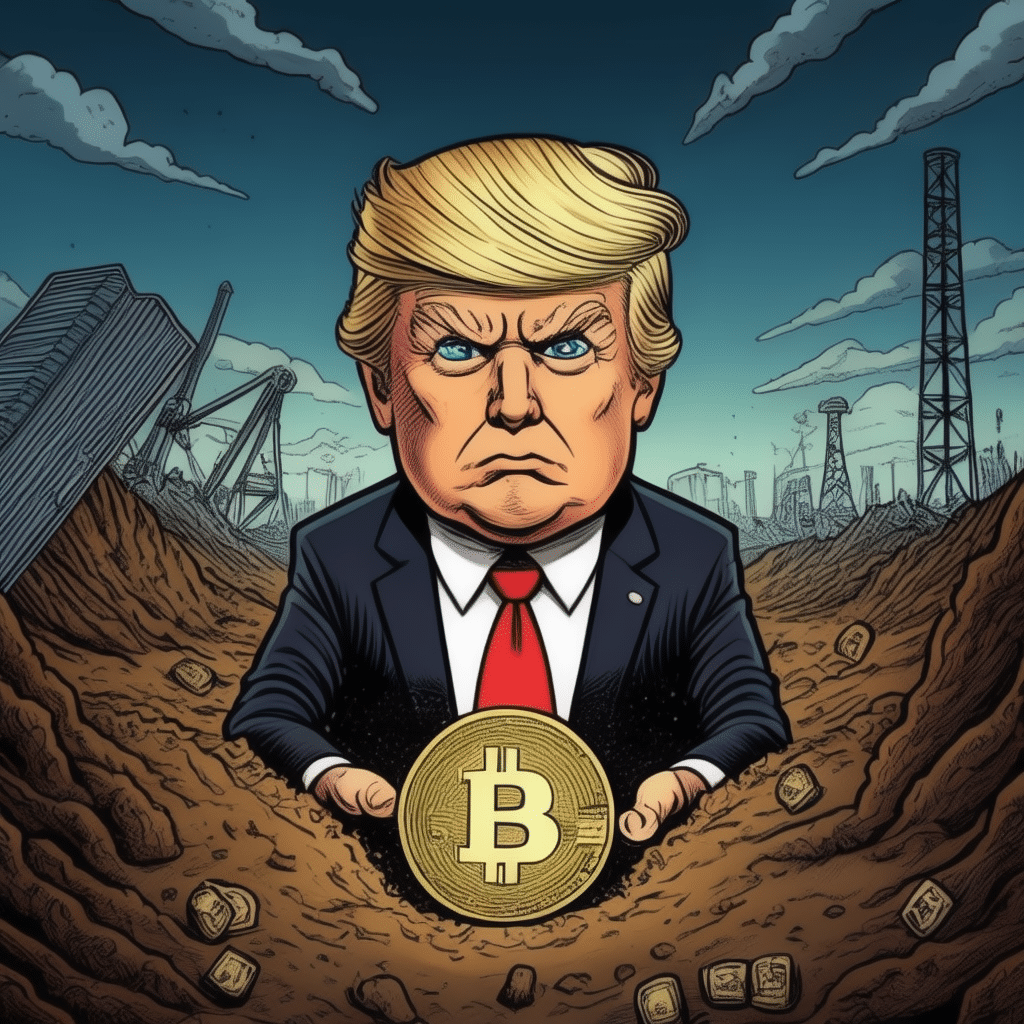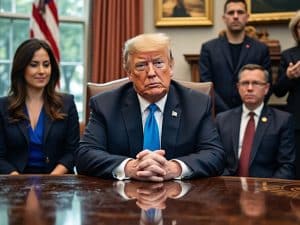Why the Crypto Industry Should Not Align with Politicians Like Donald Trump

Why the Crypto Industry Should Avoid Political Alignments
The world of cryptocurrency finds itself mixing with the realm of high-stakes politics, as former President Donald Trump made headlines with his call for a domestic bitcoin mining industry in the United States. Using his Truth Social platform, Trump expressed a desire for the U.S. to produce “all the remaining” bitcoin—approximately 2.1 million units—asserting that this move would help the country achieve energy independence and counter the threat posed by a central bank digital currency. This announcement came after a discussion between Trump and Bitcoin Magazine CEO David Bailey, held at the former president’s Mar-a-Lago resort, with representatives from major bitcoin mining firms such as CleanSpark, Riot Platforms, and Marathon Digital in attendance.
Trump’s statement is the latest in a series of pro-crypto declarations, including his pledges to defend the right of self-custody, accept crypto donations for his campaign, and oppose regulatory threats from other politicians like Senator Elizabeth Warren. Given Trump’s polarizing nature—his favorability rating has never exceeded 50% in the U.S.—it is not surprising that his stance on crypto is similarly divisive. It also marks the first substantial comment from Trump on Bitcoin since 2019 when he openly criticized the digital currency stating that he was “not a fan” of Bitcoin, labeling it as “highly volatile” and based on “thin air”. More recently, he referred to Bitcoin as a “scam” competing against the U.S. dollar and called for heavy regulation of cryptocurrencies.
This dates from 2019 for instance.
In this interview from 2021 for instance, Trump still says literally “I’m a big fan of the dollar”.
Reactions Are Positive and Not Positive
The opinions on Trump’s announcement are rather varied.
Alex Bergeron of Bitcoin Magazine views the statement as a positive geopolitical signal, suggesting that recognition from a figure as prominent as Trump could stimulate global mining activities and contribute to network decentralization.
While the concept of onshoring bitcoin mining aligns with ongoing trends, particularly following China’s 2021 ban on the practice, Trump’s suggestion that all mining should be U.S.-based demonstrates a fundamental misunderstanding of Bitcoin’s decentralized architecture.
That’s also what critics like Margot Paez, co-founder of the Bitcoin Policy Summit, argue. According to them centralizing bitcoin mining in the U.S. contradicts the decentralized nature of Bitcoin. Centralization could expose the industry to greater regulatory risks and political interference, which is contrary to the ethos of decentralization that underpins Bitcoin. Paez also points to the Biden administration’s proposal of a 30% tax on bitcoin mining as a potential threat.
Despite Donald Trump’s ambitions, Bitcoin’s decentralized nature makes it improbable that mining activity would ever concentrate in a single region. The critical question is whether U.S. efforts to dominate bitcoin mining could prompt other countries to implement similar strategies. Given Donald Trump’s – let’s say contentious – standing among global leaders, this scenario seems unlikely.
A Domestic Bitcoin Mining Industry Is Not A Crypto-smart Idea
We do know that governments are involved in Bitcoin mining already, Whit Gibbs, a cryptocurrency expert and White House adviser, already implied during an interview that the U.S. government is probably engaged in Bitcoin mining, a statement that aligns with information from a former intelligence agent who suggested that such activities have been occurring since 2013.
However, there are various reasons to dismiss this domestic – take it all – bitcoin mining industry idea from Trump which will fuel skepticism and distrust within the community.
1. Maintaining Decentralization and Independence
The core ethos of cryptocurrency, particularly Bitcoin, is decentralization. Aligning with any political figure, especially one as polarizing as Donald Trump, contradicts this principle. Cryptocurrencies are designed to be independent of centralized control, including governmental and political influences. Any perceived or real alignment with a politician could undermine this foundational principle.
2. Avoiding Polarization
Political figures often come with significant baggage and polarizing opinions. Associating with a specific politician can alienate a large segment of the population. For instance, Trump’s endorsement may attract some supporters but repel others, especially those who strongly oppose his policies and views. The crypto industry needs to appeal to a broad, diverse audience to ensure widespread adoption and trust.
3. Risk of Regulatory Backlash
Political figures and their parties can change their stance based on shifting political winds. What might be support today can quickly turn into opposition tomorrow. By aligning with a very unstable politician like Trump, the crypto industry risks being caught in the crossfire of political battles, leading to unfavorable regulations or policies. Politicians are also prone to using industries for their agendas, which might not always align with the industry’s best interests.
4. Compromising Integrity and Ethics
Cryptocurrencies like Bitcoin thrive on the principles of transparency, integrity, and ethical practices. Politicians, however, often engage in strategies that might involve compromises and dubious tactics. Associating with politicians will lead to a perception that the crypto industry is willing to compromise its values for short-term gains, damaging its long-term credibility and trustworthiness.
5. Instability and Uncertainty
Political landscapes are inherently unstable. Elections, policy changes, and international relations will undoubtedly impact a politician’s influence and stance. Tying the crypto industry’s fate to a political figure means subjecting it to these uncertainties, which can hinder strategic planning and long-term development.
6. Diluting the Core Message
The core message of cryptocurrency revolves around financial freedom, decentralization, and empowerment of individuals. Associating with a politician will dilute this message, making it appear as though the industry is just another player in the political arena rather than a revolutionary technology with the potential to change the financial landscape.
7. Undermining Global Appeal
Cryptocurrencies are inherently global. Aligning with a specific politician, especially one with contentious international relations, will hinder the global appeal of crypto. It will create friction in countries that oppose the politician or his policies, leading to regulatory challenges and barriers to adoption.
In Short, Don’t Align With Politicians Such As Donald Trump
While we do understand that the crypto industry might benefit from political support in the short term, the long-term risks and downsides far outweigh these benefits. The industry should strive to maintain its independence, uphold its ethical standards, and remain apolitical to ensure sustainable growth and widespread adoption. By doing so, it can safeguard its foundational principles and continue to be a beacon of decentralization and financial freedom.
The broader issue at hand though is whether Donald Trump’s pro-crypto statements represent genuine support or mere political pandering. Political endorsements simply will compromise the industry’s integrity. The political backing currently skews towards the right, but there are figures like Uniswap’s Marvin Ammori who advocates for the crypto industry to remain neutral and apolitical. Ammori’s viewpoint, emphasized during a debate with Trump supporter Ryan Selkis at Consensus 2024, quite well shows the strategic advantage of avoiding partisan entanglements.
The crypto industry must carefully consider whether aligning with political figures like Trump serves its best interests on the short and long-term. Gaining support from influential politicians might seem advantageous in the short term, but maintaining an apolitical stance is crucial for preserving the industry’s independence and integrity.







